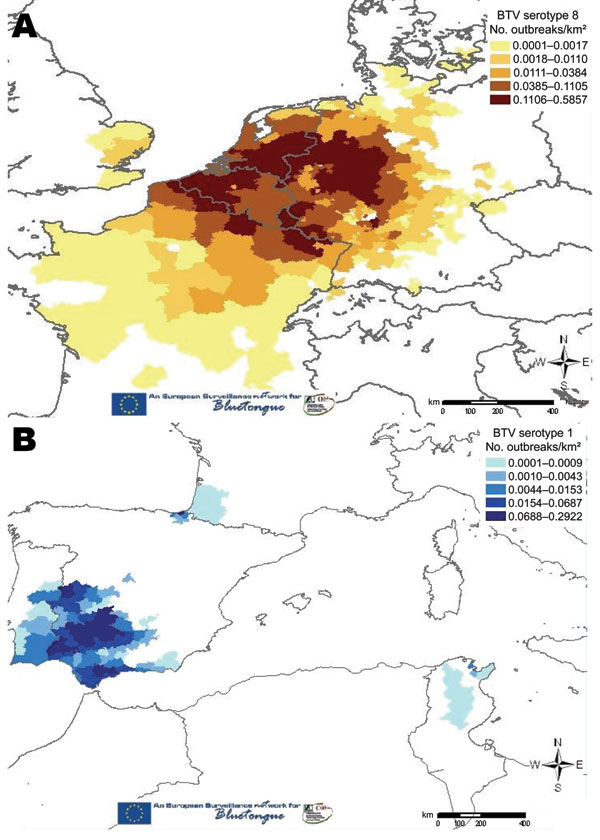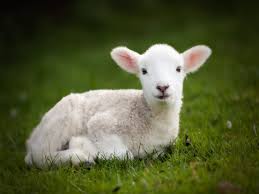As Bluetongue virus 8 was making its way to the UK in 2007 I was asked by a farmer whether or not he should vaccinate when the vaccine became available. 100% yes was the answer, and would be now. BTV-8 was a particularly virulent strain, resulting in mass death in sheep and even (unusually for BTV) causing disease and deaths in cattle. Bluetongue had never before been to the UK, so the entire herd was susceptible to the virus. The result was that, whilst East Anglia experienced a few outbreaks in 2007, the vaccine prevented recrudescence of the virus in 2008; unlike what happened on the continent after 2007, where BTV overwintered from 2006 and erupted in 2007 to cause the largest outbreak of BTV in history.
 |
| Bluetongue virus did eventually reach the UK, but vaccination stopped it from progressing |
This week saw the news that a vaccine for Schmallenberg virus will be available from Merck by the summer. The obvious assumption is that every farmer will be desperate to vaccinate. That would be no surprise considering the damage it's done this past year, in particular to the sheep industry where countless lambs have been lost as a result of the disease.
But the same question now arises - should you vaccinate? This time the situation is very different. We've had it. Would vaccinating now be the equivalent of the metaphorical slamming the stable door after the horse has bolted etc.? If current reports from the continent equate to the UK, then the majority of cows and sheep will be immune, in which case a vaccine might be of limited value. There will however be some naive animals which somehow avoided becoming infected, and once maternal antibody has waned this years offspring will be open to infection.So vaccinate, right?
In the case of human diseases, the choice to vaccinate is generally simple; vaccinate. Similarly, most horse and pet owners would probably also vaccinate their animals in the face of an emerging disease (assuming a vaccine were available). Farming is different though; farming is to make money. The option to vaccinate is no longer based upon sentimentality, but business. How much do you stand to lose if there's an outbreak, relative to how much it costs to vaccinate when there's only the possibility of an outbreak? In the case of BTV the evidence from the continent was that it would be devastating. The choice to vaccinate was clear.

With SBV however, does it make sense from a business perspective to spend a lot of money to vaccinate the flock/herd? Say 90% of the animals are immune - a reasonable guess based upon studies on the continent. To begin with this level of seroprevalence already makes it more difficult for an outbreak to persist. Ignoring that, and assuming the extent of infection will be the same as last year, 9% of the flock would in theory become infected. If in turn we assume only 10-20% of those infected would be affected clinically, that's only 1-2% of the overall flock/herd.
In a flock of 1000 animals, 10 animals may be affected. Is that a sufficient number to warrant vaccinating 1000 sheep? Would you vaccinate a herd of 500 cattle on the basis there might be 5 cases of acute disease? Clearly such numbers are approximate, and may be wide of reality, but they're realistic enough to shows there's a difficult choice to make. I can't advise on whether or not to vaccinate, but I do know it's going to be a tricky choice for those involved.
In the case of human diseases, the choice to vaccinate is generally simple; vaccinate. Similarly, most horse and pet owners would probably also vaccinate their animals in the face of an emerging disease (assuming a vaccine were available). Farming is different though; farming is to make money. The option to vaccinate is no longer based upon sentimentality, but business. How much do you stand to lose if there's an outbreak, relative to how much it costs to vaccinate when there's only the possibility of an outbreak? In the case of BTV the evidence from the continent was that it would be devastating. The choice to vaccinate was clear.
With SBV however, does it make sense from a business perspective to spend a lot of money to vaccinate the flock/herd? Say 90% of the animals are immune - a reasonable guess based upon studies on the continent. To begin with this level of seroprevalence already makes it more difficult for an outbreak to persist. Ignoring that, and assuming the extent of infection will be the same as last year, 9% of the flock would in theory become infected. If in turn we assume only 10-20% of those infected would be affected clinically, that's only 1-2% of the overall flock/herd.
 |
| You're fired: does it make business sense to vaccinate animals when there might not be any need? |
No comments:
Post a Comment